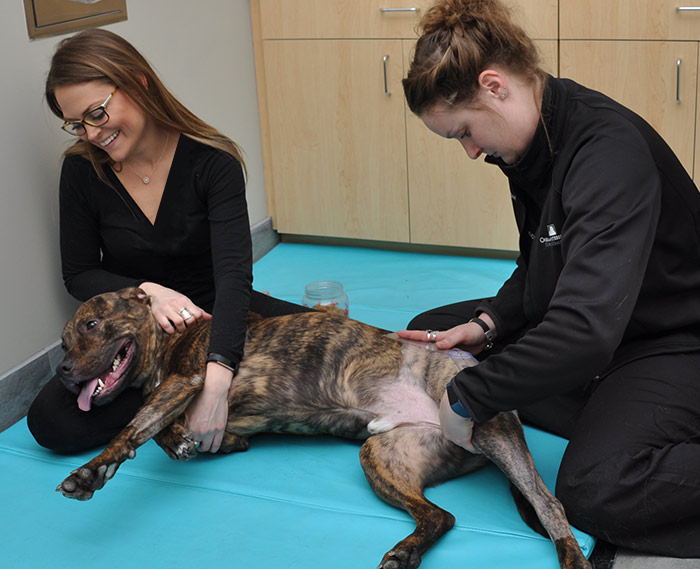What do I do?
Well, first, don’t panic. Having hip dysplasia does not necessarily condemn your dog to a life of crippling debility. The fact is, most dogs with hip dysplasia are minimally affected and can lead active lives with little or no treatment. For those dogs with significant lameness, a good quality of life can often be achieved with medical or surgical therapy.
Hip dysplasia is an inherited disease. Dogs with hip dysplasia should not be bred because they will pass the genes onto their offspring. Hip dysplasia is an incongruency in the hip joints that is present when dogs are young puppies. This causes the hips to subluxate (partially dislocate) as the dog walks. As they age, this tends to cause cartilage damage, resulting in arthritis. The arthritis usually starts before one year of age and progresses throughout their life. However, the degree of lameness that this arthritis will cause is extremely variable.
If your dog has hip dysplasia and is not lame, treatment other than a high quality Glucosamine/Chondroitin supplement to preserve cartilage health and slow arthritis may not be indicated. If your dog’s lameness is mild, he will likely respond well to the addition of an anti-inflammatory pain medication. Most over the counter pain medications are too harsh for dogs, but many “dog safe” varieties are available from your veterinarian. Alternative therapies such as acupuncture have also been known to help in mild cases.
If your dog is severely affected and medical treatment alone is ineffective, there are several surgical options available that can keep your dog happy, active, and comfortable. These include corrective surgeries for puppies such as pubic symphodesis and triple pelvic osteotomies, as well as salvage procedures for arthritic dogs, such as hip replacement and femoral head ostectomy.
In short, hip dysplasia does not have to be a heartbreaking disease and many options are available to maintain a happy, active lifestyle for your dog. Please discuss these options with your dog’s family veterinarian or, if recommended, a local surgical specialist.
Dr. Joseph M. Prostredny, DVM, MS, DACVS
Chesapeake Veterinary Surgical Specialists


